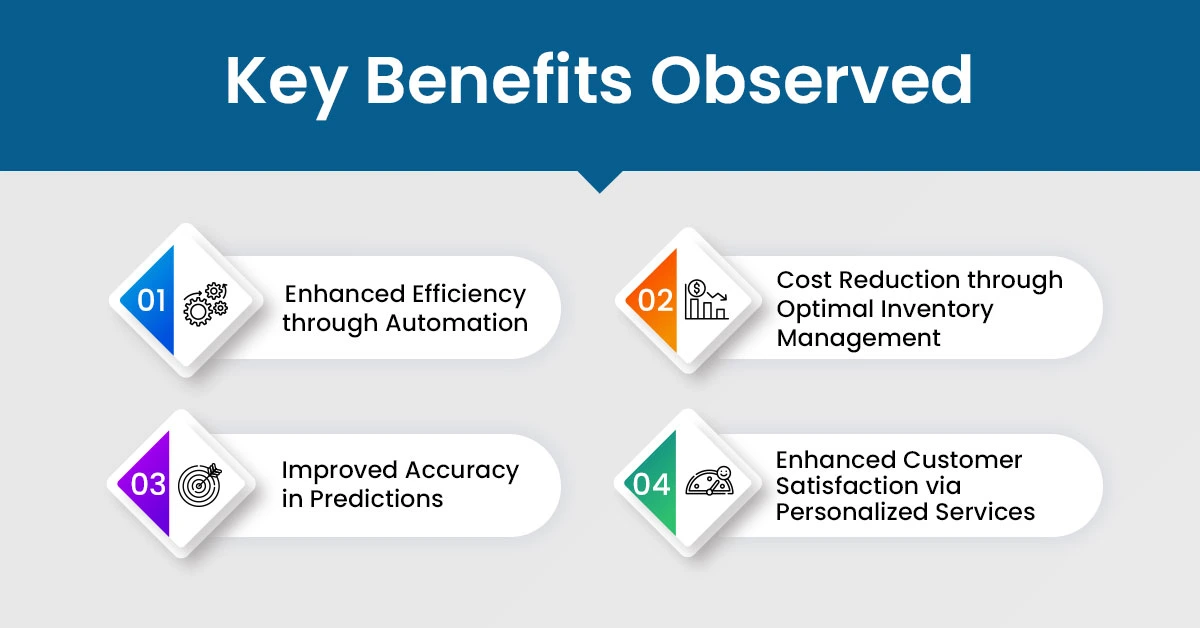Enhancing Decision-making with ML Services: A Case Study

5 min read
Incorporating Machine Learning (ML) technologies is an important development in decision-making processes. Not only trendy terms but artificial intelligence (AI) and machine learning (ML) are completely changing the way businesses function. Here, we explore a case study highlighting the revolutionary potential of AI and ML, especially for automating decision-making procedures.
The Power of AI and ML in Decision-Making
Businesses in a variety of industries now carry vital resources for making decisions on artificial intelligence (AI) and machine learning (ML). The transformative power of AI and ML lies in their ability to sift through and analyze large datasets and extract meaningful information that drives major company choices.
Business intelligence is changing as a result of AI and ML technology. In the past, human intuition and experience played a major role in commercial decision-making. Although valuable, these methods could not always keep up with the complexity and speed of contemporary market dynamics. With the introduction of AI services, businesses can now manage enormous amounts of data that human analysts would not be able to process in a reasonable amount of time. These technologies increase the accuracy and effectiveness of business decisions by making it possible to identify minute patterns, trends, and correlations hidden from view.
AI and ML for Informed Decision-Making
Predictive analytics is one of the biggest benefits of AI and ML in decision-making. AI algorithms can estimate future trends by evaluating historical data, giving organizations a higher degree of accuracy when anticipating changes in the market, customer behavior, and potential dangers. Strategic planning, risk management, and maximizing operational efficiencies all depend on this predictive skill.
I and ML for Informed Decision-MakingFurthermore, AI and ML play a significant role in automating a substantial part of the decision-making process. AI-driven automated decision systems are capable of making quick decisions in domains like targeted marketing, inventory control, and financial trading. These methods ensure more consistent and trustworthy decision-making by increasing efficiency and removing the chance of human error.
However, AI and ML democratize data analysis by facilitating greater access to data analysis within an organization. The potential of machine learning is now accessible to people without extensive experience in data science by advanced AI tools and platforms, such as AutoML solutions. With this democratization, more workers can make decisions based on data through, promoting an educated and impartial analysis culture across the entire company.
Firms can customize their offerings by incorporating AI and ML into decision-making processes. Businesses can improve customer happiness and loyalty by customizing their offers to match individual tastes through the analysis of consumer data. In the pre-AI period, this level of customization was unthinkable, and it offered a substantial competitive edge in the current market.
Case Study: Implementing AutoML Solutions

A small retail business facing difficulties with inventory control and customer service is the subject of this case study. The company’s transformation into an AutoML-embracing organization demonstrates a major change in how contemporary companies use advanced AI technologies to solve challenging operational problems. Among the distinctive features of AI is AutoML, which makes complex data analysis understandable to people with little experience in the area by streamlining and automating the application of machine learning.
-
The Scenario before AI Integration
The organization used conventional demand forecasting and inventory management methods before integrating AI and ML technologies. These techniques usually entailed making educated guesses and manually analyzing data. Consequently, the business regularly experienced issues such as stockouts and overstocking. In addition to tying up cash in unsold goods, these inventory mismatches resulted in missed sales opportunities and disgruntled customers due to unavailable supplies. Furthermore, the decision-making process was extremely slow, and forecasting and inventory planning frequently involved human mistakes. This traditional method was shown to be a major roadblock to the company’s productivity and client satisfaction levels.
-
Transition to AutoML Solutions
The company’s operating approach underwent a significant shift with adopting AutoML technologies. With sophisticated AI services like AutoML, which automates the creation of machine learning models, the business may use advanced data analysis tools to solve real-world issues without requiring highly skilled machine learning personnel. This change was a calculated effort to use AI and ML’s promise to help solve problems with inventory and customer service management.
-
Impact Post AI Integration
Operations at the organization underwent a radical transformation after AI and ML technologies were implemented. The artificial intelligence (AI) methods used could generate highly accurate predictive models. The organization was able to maintain ideal inventory levels because these models were able to predict client demand with reasonable accuracy. Significantly fewer overstocking and stockout incidents occurred once AI-driven forecasting was implemented.
Moreover, the process of making decisions was extremely efficient and well-organized. With predictive insights and real-time data analysis, the business could decide on inventory management quickly and intelligently. The amount of waste was reduced significantly, in terms of time and resources, by this increased efficiency.
Furthermore, there was a direct and favorable correlation between the enhancement of inventory accuracy and customer happiness. Customers were more likely to locate the necessary products in stock, which improved their shopping experience and increased brand loyalty. A key element in the company’s expansion and enhanced standing in the marketplace was customer service enhancement.
Read More: Implementing AI-driven automation in Manufacturing and Industry
Key Benefits Observed
-
Enhanced Efficiency through Automation
The company’s operational efficiency was significantly increased by automating decision-making processes by applying machine learning (ML). Data analysis was traditionally labor-intensive and time-consuming, frequently resulting in a delay in responding to changes and trends in the market. However, the business might automate the examination of enormous datasets with machine learning solutions, considerably reducing the amount of time spent on these jobs. Quicker and more flexible reactions to changes in the market were made possible by this automation. Reacting quickly to shifting market conditions is essential to keeping a competitive advantage, and ML automation’s increased efficiency was a major factor in gaining this flexibility.
-
Improved Accuracy in Predictions
The improved predicting accuracy was one of the biggest advantages, mostly as a result of the advanced AI services used for forecasting. These artificial intelligence (AI) systems use historical and contemporary data trends analysis to forecast future market demands and consumer behavior accurately. This degree of predicting precision played a key role in reducing losses brought on by overproduction, understocking, or resource misallocation. The predictive capacity of AI improved decision-making and decreased the likelihood of expensive errors, both of which improved the company’s overall financial standing.
-
Cost Reduction through Optimal Inventory Management
Optimal inventory management was achieved by integrating AI and ML systems, leading to significant cost reductions. Effective inventory management requires striking a careful balance; too little inventory can result in missed sales and disgruntled consumers, while too much inventory raises holding costs. Utilizing AI for inventory forecasting would allow the business to keep the proper inventory while reducing wasteful storage expenses and stockout risks. Long-term cost savings from this excellent inventory management contributed to the company’s increased profitability and sustainability.
-
Enhanced Customer Satisfaction via Personalized Services
The increase in consumer satisfaction was arguably one of the most notable outcomes. The organization could better comprehend client wants tastes, and purchasing patterns because of AI’s sophisticated data analysis skills. A more individualized shopping experience was produced due to the company’s ability better to match client expectations with its services and product offers. Customers were also more likely to discover what they were looking for! Which increased their satisfaction when better stock availability matched customer demand. This increase in service quality was important to creating a strong brand reputation and fostering customer loyalty in the current market, where customer experience is an essential distinction.
Conclusion
This case study exemplifies how AI and ML are transforming the decision-making process for enterprises. By implementing these technologies, businesses may greatly increase their productivity and accuracy, which will boost overall performance. Businesses are realizing that AI and ML are essential to being competitive in the fast-paced, data-driven world of today as more and more of them implement these technologies. Utilizing AI services will become very important for business success in the future—not just to remain ahead of the competition but also to stay ahead of a constantly changing market. This movement toward AI and ML represents a fundamental change in how businesses function and prosper, not merely a fad.
Published: February 2nd, 2024





